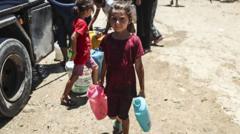After several days of discussions, negotiations for a Gaza ceasefire and hostage release between Israel and Hamas have come to a standstill, according to a Palestinian official.
Gaza Ceasefire Negotiations Hit Roadblock Amid Netanyahu-Trump Talks

Gaza Ceasefire Negotiations Hit Roadblock Amid Netanyahu-Trump Talks
Tensions mount as critical decisions obstruct progress in securing a humanitarian ceasefire in Gaza.
In an ongoing diplomatic effort, Israeli Prime Minister Benjamin Netanyahu is in the US where he engaged in an unscheduled second meeting with former President Donald Trump, aimed at rejuvenating the stalled ceasefire talks. Negotiations held in Qatar reportedly faced significant hurdles, particularly surrounding the distribution of aid during the proposed ceasefire and the withdrawal of Israeli troops.
The Israeli Prime Minister acknowledged the focus of his discussions with Trump was the plight of hostages held by Hamas, asserting Israel's resolve to secure the release of both living and deceased captives. According to Israeli sources, around 50 individuals remain captive, with approximately 20 confirmed to be alive. Meanwhile, US Special Envoy Steve Witkoff expressed optimism, stating that the parties are converging on a singular issue and are close to finalizing a 60-day ceasefire agreement by the week’s end.
Contrarily, progress has been reported as minimal since the last round of negotiations began, with the Palestinian official indicating that talks remain stalled. The core issue seems to be Israel's reluctance to allow unrestricted aid influx into Gaza, with claims of maintaining a limited distribution mechanism that sources describe as degrading.
Qatar, serving as a mediating nation alongside the US and Egypt, acknowledged the challenges at play, indicating that more time will be necessary to achieve a breakthrough in the talks. Amidst these negotiations, violence continues, with recent airstrikes in southern Gaza resulting in further casualties—highlighting the pressing need for a resolution to the ongoing conflict.
While reports suggest a proposed exchange framework involving hostages and imprisoned Palestinians could lead to increased humanitarian aid, the complexity of the discussions in Doha underscores the challenges that remain before a ceasefire can be reached. With the conflict having already claimed the lives of over 57,000 Gazans and left countless others in dire conditions, the international community watches closely for any signs of progress.
The Israeli Prime Minister acknowledged the focus of his discussions with Trump was the plight of hostages held by Hamas, asserting Israel's resolve to secure the release of both living and deceased captives. According to Israeli sources, around 50 individuals remain captive, with approximately 20 confirmed to be alive. Meanwhile, US Special Envoy Steve Witkoff expressed optimism, stating that the parties are converging on a singular issue and are close to finalizing a 60-day ceasefire agreement by the week’s end.
Contrarily, progress has been reported as minimal since the last round of negotiations began, with the Palestinian official indicating that talks remain stalled. The core issue seems to be Israel's reluctance to allow unrestricted aid influx into Gaza, with claims of maintaining a limited distribution mechanism that sources describe as degrading.
Qatar, serving as a mediating nation alongside the US and Egypt, acknowledged the challenges at play, indicating that more time will be necessary to achieve a breakthrough in the talks. Amidst these negotiations, violence continues, with recent airstrikes in southern Gaza resulting in further casualties—highlighting the pressing need for a resolution to the ongoing conflict.
While reports suggest a proposed exchange framework involving hostages and imprisoned Palestinians could lead to increased humanitarian aid, the complexity of the discussions in Doha underscores the challenges that remain before a ceasefire can be reached. With the conflict having already claimed the lives of over 57,000 Gazans and left countless others in dire conditions, the international community watches closely for any signs of progress.




















